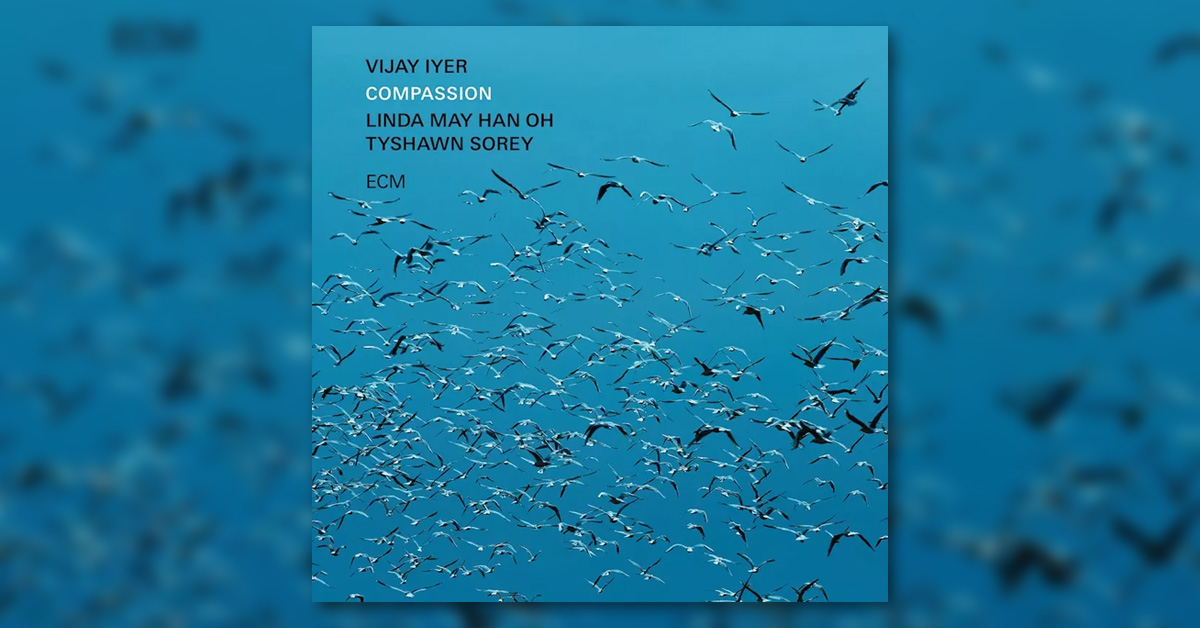The jazz trio’s follow-up to 2021’s Uneasy is irresistibly listenable, an immersive 66 minutes that exhales a particular aesthetic history even as it pulls on the pain and anxiety of our present.
By Daniel Felsenthal for Pitchfork
Rating: 8.1
Few pianists vary a theme better than Vijay Iyer, whose new album Compassion, with bassist Linda May Han Oh and drummer Tyshawn Sorey, flows with the smooth, pathfinding quality of shallow water in a rocky stream. The 52-year-old’s fingers worry over melody: He reconsiders, restates, and repeats phrases as though he hasn’t quite made himself clear. What does Iyer need to tell us so urgently? Motion itself is the message, how life barrels forth during periods of unimaginable struggle.
Iyer’s overpowering voice on the piano means that he takes center stage even when he tries not to—such as on his searing, topical post-9/11 collaboration with experimental rapper Mike Ladd, In What Language? The gravitational pull of his keys sometimes evokes Keith Jarrett, who similarly occupies the spotlight while sharing billing with fellow musical titans. And both pianists have track records with ECM, a long-time hub for jazz and contemporary classical marked by a fluid, pristine, often fusion-friendly aesthetic. Compassion is Iyer’s most characteristic release since he started recording for the German label more than a decade ago: The album is irresistibly listenable, an immersive 66 minutes that exhales a particular aesthetic history even as it pulls on the pain and anxiety of our present.
The album eschews the electronics of his phenomenal ECM debut as leader, 2013’s Mutations, and the tabla that lifted the deft interplay of 20ll’s Tirtha beyond blinkered American custom. Working with just three instruments, Compassion feels like the most sweeping outing of his oeuvre, stretching the hookier moments of this combo’s much-lauded 2021 inauguration Uneasy into extended meditations and relentless workouts. The trio’s take on Geri Allen’s “Drummer’s Song” reappears here as not only a fantastic closer, but also a barometer for their ongoing growth. Uneasy stripped the cheeky maximalism of the late pianist’s initial arrangement to essentials, while Compassion blurs the song at its edges, letting it bleed into the band’s take on a composition by beloved saxophonist John Stubblefield. Compassion is widescreen in both emotion and concept. Uneasy poked at news stories of the day, notably the Flint water crisis. The group’s latest paints its thematic tableau in broad strokes of sanguinity: “It Goes,” “Overjoyed,” and “Panegyric” suggest expansive, resilient sentiments that burn on in spite of the claustrophobia of moment-to-moment fear.
The songs on Compassion had different genesises, but they’re in conversation, like answers to questions that Iyer has posed since his career’s start. Several of the numbers were written for an event honoring COVID victims, while others took shape as part of a project saluting poet and scholar Eve Ewing, whose nonfiction has most famously explored the bigoted legacy of school closures in Chicago. “It Goes,” a ballad with a dreamy, singular cadence that raises a potentially slow stretch to profundity, was originally penned as a setting for lyrics that imagined Emmett Till had lived a long life—instead of being kidnapped, tortured, and lynched by Mississippi racists at the age of 14.
Compassion shivers with the horror of these roots, but its relentless sense of pacing means that the album never feels like a compilation of works written on commission. “Panegyric” slows the disc down after several numbers glide and ripple, while the Roscoe Mitchell cover “Nonaah” forms a dissonant scar in the LP’s center, beautifully disfiguring an otherwise tuneful mood. Compassion’s brushes with social history are hardly uncharted for Iyer, even when he holds himself solely to instrumentals, as he does here. Still, the casually-worn expertise and inlaid sorrow that he brings to the task seem like the culmination of a life pursuit.
On the level of performance, Iyer operates in his heroic strain—how Coltrane sounds on “My Favorite Things,” as though despair and giddy optimism are always just a note away. On the electrifying “Maelstrom,” his arpeggios sound like a chorus of voices, circling each other in a canon. His static harmonies and slippery refrains, though, float along thanks to the life raft offered by Oh and Sorey.
The double bassist, whose The Glass Hours was an excellent, overlooked jazz release from last year, approaches her instrument with a melodic facility that refuses flashiness. Oh often solos on the lower register of her upright, as Iyer points out in the liner notes—capturing ghost images that are faint but alter their surroundings dramatically. Elsewhere, she subsumes and redefines the pianist’s lead lines, taking over the head of the gorgeous “Arch” so that it thrums like a fading memory. Stately “Where I Am” is a roomier opportunity for her to rove, while her interplay with Sorey on the final cut fosters the record’s busy apex, an exhibition of each player’s individuality that serves a sprawling scape of collective feeling—grief for the dead, like admiration for the living, is layered with a knowledge of life’s immense and terrible possibility. Compassion flourishes in this furrow between awe and hardened forbearance.
Sorey can feel restrained with this three-piece, in comparison to his often prickly, uncompromising work as a bandleader. He plays with fewer frills than he did on Uneasy—but his fantastic instincts make the consistency of his beats another motor behind the record’s forward locomotion. The serpentine “Ghostrumental” emerges from his boom-bap constancy, before a stutter-step snare enables the track’s genius climax. He knows how to accent and echo Iyer’s piano on the limited tonal palette of a drumset, and his supple touch on the cymbals and toms, a surprising quality from a percussionist who can thrash with his wildest peers, gives the record a palpable sense of texture.
Compassion never puts us face-to-face with current events. Instead, it builds an imaginative space within the real world, a reverie that begins when you stop cogitating and allow minutes to embark on their unstoppable march. Listening to Compassion at home, on headphones, my mind drifted to Emmett Till, and after to the thousands of children in Gaza who have been slaughtered in recent months. Such lives would have taken countless different directions had they continued, and perhaps the only assured commonality is that each of these hypothetical adults would have had to navigate a shifting relationship with time as they aged—decades, memories, and experiences that accrue to bend and kink duration. Getting older is a human right too often denied, perhaps why Compassion feels inescapably political. To hear the seconds elapse alongside Iyer, Oh, and Sorey—as they braid motifs into something so lifelike that it can outlast hopelessness and cynicism—is a gift, a tool, and a reality check, served up in the hopes that one day all people will have the luxury to sink into their dreaming.

